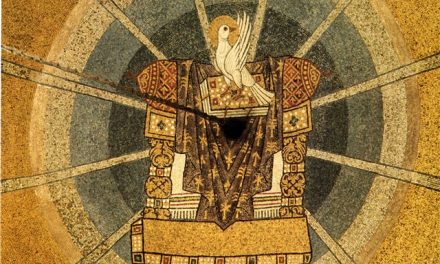1 Kgs 19:4-8
Ps 34:2-3, 4-5, 6-7, 8-9
Eph 4:30—5:2
Jn 6:41-51
In this week’s readings, we’re continuing to be schooled in what it means to partake of the Eucharist. Last week, we heard about the “bread of life”; the week prior, we were part of the “loaves and fishes” crowd. This week, we hear about having bread for the journey of our lives – the journey each one of us takes to encounter God. We discover that this journey toward God sometimes begins exactly at a moment of crisis, even paralyzing crisis – but that Jesus offers us a way forward.
We find ourselves first with Elijah, having an encounter with an angel of the Lord. In the verses before today’s passage, Elijah has just had a violent encounter with the Israelite King Ahab and his false prophets, who had turned the people away from God. Ahab is in hot pursuit, seeking vengeance against Elijah because Elijah and his men have slaughtered the prophets of Baal.
Elijah does not know what to do; his own vocation has a prophet has been shaken, for we hear him calling to God: “Take my life, for I am no better than my fathers.” Elijah expects to die there in the desert, for he apparently has no food, no water, and no traveling companions.
Yet in the middle of the night, Elijah is visited by an angel of the Lord and given food to eat and water to drink. In fact, the angel exhorts him to over eat, for he is going on a long journey. Today’s passage does not communicate what the long journey is for, but reading ahead we see that this long journey will eventually culminate in Elijah meeting God at Mt. Horeb – where he will encounter God. God will not show himself in loud obvious ways (wind, fire, earthquake) but in “a light silent sound.” (1 Kings 19:12)
In other words, at a crisis point in his life, Elijah is receiving bread for his literal journey to God at the mountain.
Who among us has not experienced a similar crisis point in faith, maybe especially when trying to do what we think God wants us to do – but we discover we’re entirely unsure we’ve done that – and moreover, we just want to give up. I’m thinking about two specific such points in my life.
One is when I made a decision to get a divinity degree at a particular school. It ended up being a really bad decision on my part, and I kept thinking, “Didn’t God send me here? Or did I just not hear God’s voice?” A second is when I experienced further hearing loss and felt like my world was closing in on me.
Both cases led to a crisis of faith, and a sense that I should just give up. In both cases, though, I was reminded that there is no where I can go where God is not. There is no decision I can make (even one that is not the best decision) where God is apart from me. (Psalm 139!).
Jesus’ statements about being the Bread of Life make clear this is a forever journey. We are always seeking God. We may not be physically walking 40 days and 40 nights, but in our daily journeys, we have a way to encounter God. God the Father draws us into Jesus’ own life, which we receive in the bread of the Eucharist:
No one can come to me unless the Father who sent me draw him,
John 6:44
and I will raise him on the last day.
One crucial point we begin with in moral theology is precisely this journey to God – for God is our end, our life. One way to think about moral life is precisely that it is a way to name our journey to God. May we seek, as Paul exhorts in his letter to the Ephesians, to be people imbued with the virtues of compassion and kindness. (How important that is in our divided US!)
But may we also know that when we fail – or when we feel that perhaps our journey is getting us nowhere – God will still be there for us, and most especially in the bread of heaven that we receive in the Eucharist.





